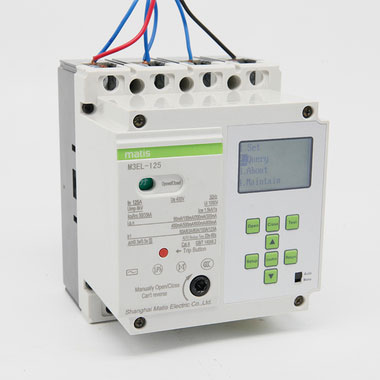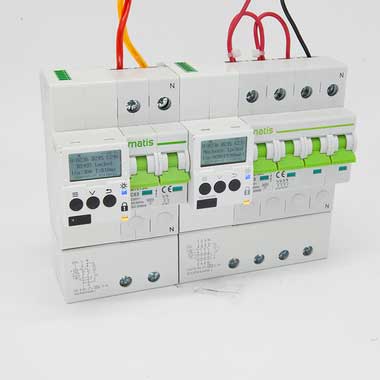RCBO vs RCCB: Differences Between the Two Circuit Breakers
2023/06/01 丨Technical
Residual current devices (RCDs) are a vital part of building electrical safety. Common RCD types are residual current circuit breakers with overcurrent protection (RCBO) and residual current circuit breakers (RCCB). They provide protection against electric shock by monitoring the flow of current and breaking the circuit when necessary.
RCCBs and RCBOs perform the same basic function of detecting fault currents and breaking the circuit if necessary. However, there are some important differences between the two types of devices.
What are RCCBs and How do Work?
Residual current circuit breakers (RCCBs) are designed to prevent leakage currents in electrical circuits by detecting and interrupting ground faults. They are typically used in electrical systems in residential and commercial buildings. Their main purpose is to protect people and equipment from electric shock by interrupting the current when a fault is detected.
The RCCB continuously monitors the currents in the circuit. Normally, the current flowing through the live conductor should be equal to the current flowing through the neutral conductor. If there is an imbalance between the two, there is a risk that some of the current will leak. When the RCCB detects this imbalance, it immediately breaks the circuit to protect people and equipment from electric shock.
What are RCBOs and How do Work?
A residual current circuit breaker (RCBO) with overcurrent protection combines the functionality of an RCCB with additional overcurrent protection designed to protect against overloads and short circuits. RCBOs are typically used in residential and commercial electrical installations and are designed to protect a single circuit.
RCBOs function similarly to RCCBs in detecting leakage currents. However, it also contains a built-in miniature circuit breaker (MCB) for overcurrent protection as an RCBO. The MCB detects an overcurrent by monitoring the current flowing through the live wire. When the current exceeds a certain threshold, the MCB trips and opens the circuit to protect the electrical installation from damage.
Key Differences Between RCCBs and RCBOs
RCBOs provide dual protection - it provides both overcurrent and leakage protection. It trips the circuit in the event of leakage, overload, or overload and short circuit. The RCCB provides leakage protection only. It only trips the circuit in cases of leakage, not overload.
RCBOs have a higher initial cost - RCBOs are typically more expensive than stand-alone RCCBs because they provide dual protection. If your budget is tight, you can install separate MCCBs and RCCBs that may cost less than an RCBO.
RCBOs require more space - Because the RCBO integrates the functions of overcurrent and leakage current protection into one unit, it requires more installation space than the RCCB. RCCBs can be installed even in the tightest of spaces.
RCBOs have shorter trip times - RCBOs typically have shorter trip times for overload conditions than RCCBs alone. This is because the built-in MCCB in the RCBO is matched to the circuit it is protecting. When an RCCB is used with a standard MCCB, it may take longer to trip in an overload condition.
RCBOs reduce wiring effort - Because the RCBO itself provides complete protection, it reduces wiring effort. You do not need separate MCCBs and RCCBs and the connections between them. This makes for a cleaner RCBO installation.
Conclusion
In summary, both the RCBO and RCCB are important devices in the electrical system to prevent electrocutions and fires. An RCCB is a simpler device that provides leakage current protection, while an RCBO is a more advanced device that provides both leakage current and overcurrent protection. So the choice between RCCB and RCBO depends on the specific requirements of the electrical installation and the level of protection required.
- Solutions
- Products & Support
- Cases
- About us
- Contact
TEL:+86 18621879631
Email:timmy@matismart.com
Mobile phone:+86 15801814653
Address:Room 320, No.83, Huanhu West Road 3, Pudong, Shanghai, China, 201306
Wechat:+86-15801814653
Skype:timmybao2008
 沪ICP备09024882号-1
沪ICP备09024882号-1




 CN
CN





 Home
Home


